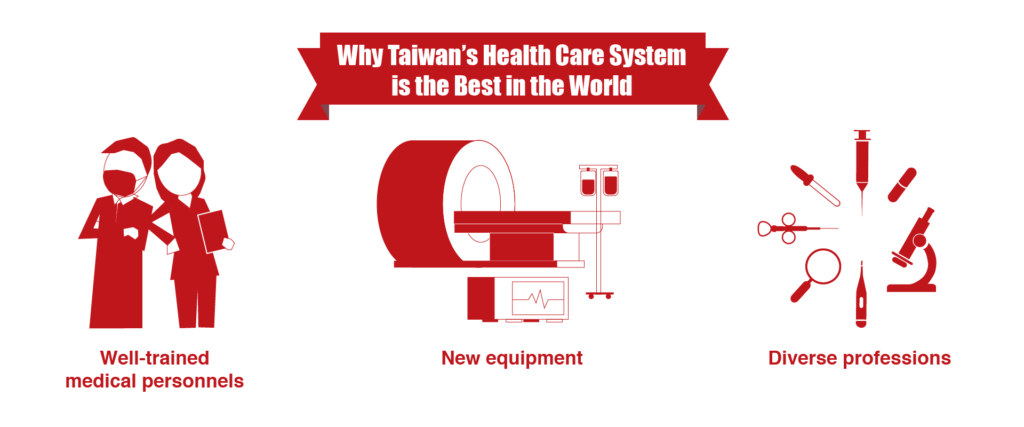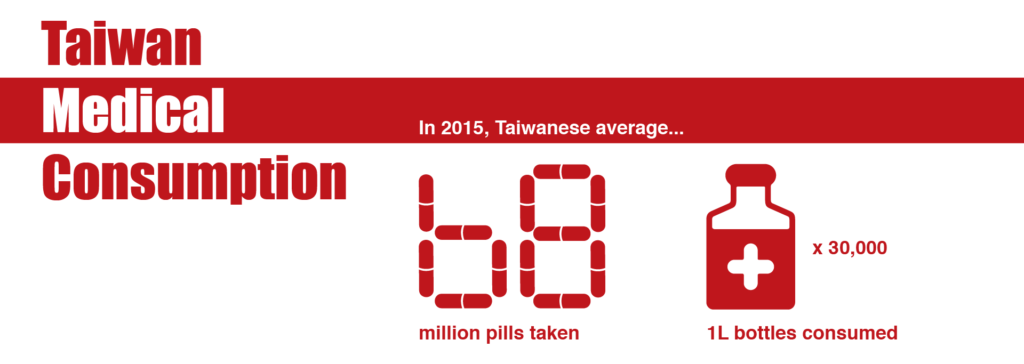Taiwanese spend nearly USD 70 million on over-the-counter every year. However, their medical service quality is known to the world.
According to the report from The Richest, a foreign finance website, Taiwan ranked first among the top 10 countries in the world with the best medical service systems. The ranking from second to tenth was Switzerland, China, Canada, United Kingdom, Germany, France, Italy, and Cuba. In 2012, the documentary “Asia new vision: Taiwan’s medical miracle” from National Geographic Channel spoke highly of Taiwan’s medical techniques. There are 14 hospitals in Taiwan listed in the top 200 hospitals in the world. Taiwan ranked closed to the U.S. and Germany in the medical industry. It led all the other countries in Asia and ranked third in the world. Taiwan’s high medical quality partially accredits to its developed National Health Insurance. However, it is interesting that over-the-counter are still popular in Taiwan, people have spent nearly USD 70 million on over-the-counter in 2015 alone.
Three reasons that allow Taiwan’s medical service to lead the world:
- Well-trained doctors: The medical schools in Taiwan are always a top priority choice for who is high school graduates. The most intelligent students gather in the medical schools have been trained with 7-years of education followed by 4-years residency. After passing the medical licensing examination, they could read to an attending physician. It takes a medical school freshman an average of 12 to 13 years to become the attending physician.
- Advanced medical equipment: Taiwan’s hospitals manipulate world-class medical equipment. For instance, they apply CT and MRI instruments for cancer inspection and Cryotherapy for cancer treatment.
- Division of specialty: Effectively avoid personal judgment bias. Doctors are willing to explain the details to the patients and their relatives to reassure them.
The paper entitled “Amazing! Taiwan’s medical technique ranked first in Asia and No. 3 in the world” from World Chinese Weekly. They had praised several of their outstanding medical techniques in Taiwan
- The first Craniofacial Center in Southeast Asia. The successful rate of cleft lip and palate operation is a 100% accuracy.
- The liver transplantation. The survival rate of 5 years after the operation has surpassed that of the U.S. It is now the most successful living donor liver transplantation in the world.
- The success rate of Roux-e-Y Gastric Bypass surgery to Type 2 Diabetes Mellitus of patients is 93.3 percent. In addiction on accomplished of with the first case of seamless Roux-e-Y Gastric Bypass surgery around the world.
- Taiwan owns distinguished egg freezing technique that the success rate in artificial fertilization rates as high as 37.7%. The live birth rate is ranging to 27.7%. Medical expenses are also relatively cheap which is another crucial factor.
- More than 10,000 successful cases of reconstructive microsurgery has been practiced in Taiwan.
Taiwan’s National Health Insurance was ranked 8th out of Taiwan’s top 10 thumb-up by CNN. Discovery channel also evaluated it as the 5th in global top 10. In 2008, Paul Krugman, the Nobel Prize winner in Economics, regarded Taiwan’s National Health Insurance as an excellent worldwide case study in his article “Pride, Prejudice, Insurance”.
Taiwan owns such a well-developed National Health Insurance to guarantee the quality of medical treatment, however some people in Taiwan are still accustomed to buying over-the-counter. According to the survey from ACNielsen, consumers in Taiwan spent USD 70 million on Over-the-counter in 2015. In January 2016, nearly USD 7 million was spend which was and increase of 3.4% compared to the same period of time in 2015. Throughout 2015, people in Taiwan took 68 million tablets or capsules and 300 million milliliters syrup (about 300,000 1L bottles). Excluding the prescription drugs, consumers spent a yearly average of USD 40 on over-on-counter, mainly for Panadol.


